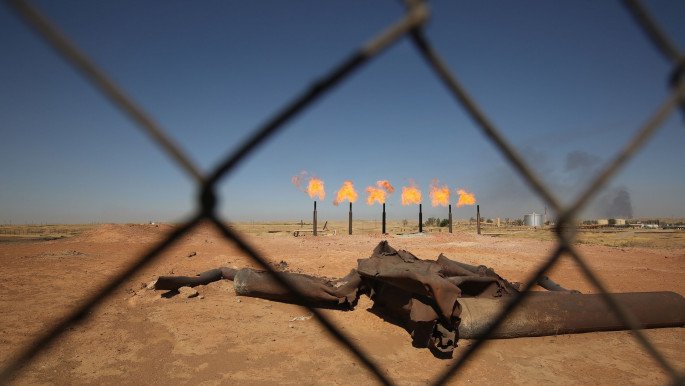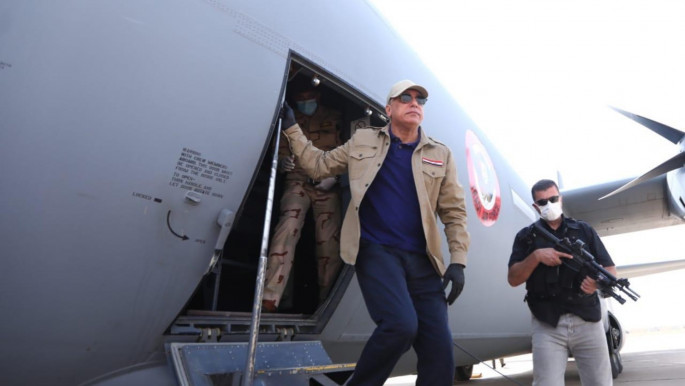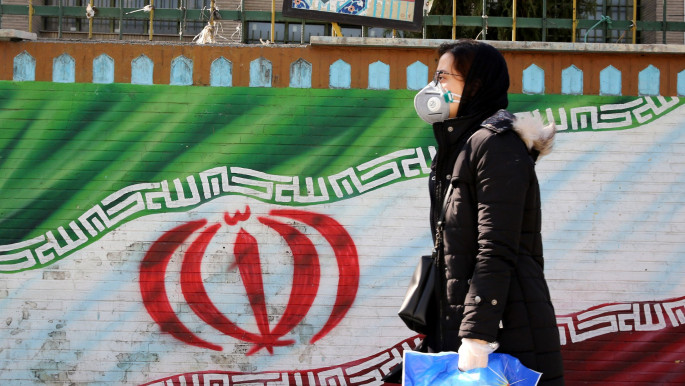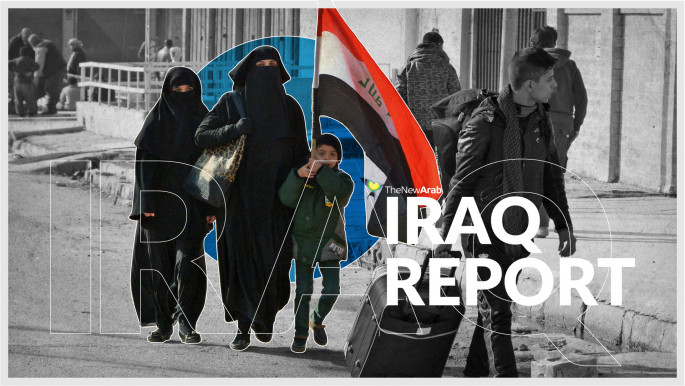The Iraq Report: Showdown with Iran-backed militias in Baghdad tests Mustafa al-Kadhimi's government
Iraq's CTS arrested more than a dozen Kataib Hezbollah militants which has triggered an armed confrontation in Baghdad's Green Zone.
Meanwhile, Iran has been busy pulling Iraq ever deeper into its orbit, likely at the US' expense. Reports have emerged that indicate previously exiled Sunni Arab politicians are making a comeback onto the political stage, while Tehran seeks to strengthen a military and intelligence pact between Iraq, Iran, Syria, and Russia.
However, much of this will also depend on how the American-Iraqi bilateral relationship will evolve following high-level strategic talks in Washington next month.
Counterterrorism units raid powerful pro-Iran militia
The CTS raided a base in the early hours of Friday morning belonging to a high profile and powerful Shia militia with close ties to Iran.
 |
Kataib Hezbollah has been at the centre of a dispute between the United States and Iraq due to its frequent targeting of American soldiers |  |
The raid targeted the Kataib Hezbollah faction which has been at the centre of an ongoing dispute between the United States and Iraq due to its frequent targeting of American soldiers in rocket attacks that have taken place with regularity since last year.
CTS forces, acting on the authority of Prime Minister Mustafa al-Kadhimi, claimed to have received intelligence of an impending rocket attack by Kataib Hezbollah militants from a location in Dora south of Baghdad.
They then moved on the militants, arresting 14 and seizing rocket launchpads as evidence that Kataib Hezbollah fighters were planning an attack.
 |
|
| Read more: Iran's economic woes frustrate Shia militias [Getty] |
Kataib Hezbollah militants immediately responded by driving a convoy of armed men to the Green Zone and threatening to storm a building controlled by the CTS unless their men were released. The militia was subsequently forced to withdraw, although it maintained a close distance as negotiations pressed ahead to resolve the situation.
What followed was a series of contradictory statements from government officials, CTS officials, and officials representing the Popular Mobilisation Forces (PMF) of which Kataib Hezbollah is part.
One government official told Reuters three Kataib Hezbollah commanders, including an Iranian, had been seized in the raid. This was immediately denied by the PMF who instead claimed that all the arrested men had been released.
Another source told AFP the 14 militants were released into US custody, but this was denied by the US-led coalition.
While it is still unclear precisely what is happening, what is now apparent is that one elite unit of the Iraqi armed forces has taken open action against men technically belonging to another branch of the armed forces.
 |
Iran has been busy pulling Iraq ever deeper into its orbit, likely at the US' expense |  |
The PMF was acknowledged as a branch of the military by Iraqi lawmakers in 2016 as the country was still wrestling with the Islamic State (IS) crisis. The same parliamentarians subsequently passed a law formalising this recognition in 2017.
Although Washington has blacklisted Kataib Hezbollah as a designated global terrorist organisation and has added its cadres and leadership to its register of known terrorists, Kataib Hezbollah has always been an integral part of the PMF and one of its more powerful constituent factions.
It is also highly unlikely Kadhimi would have ordered the CTS to move on Kataib Hezbollah without the support and encouragement of the United States. The Iraqi premier is only too aware of the extent of Iran's power within his country and over Iraqi political and military institutions, and there have been signs that he is trying to balance against Iran by moving closer to the US.
 |
|
| Read more: Who is Mustafa al-Kadhimi - Iraq's new prime minister? [Getty] |
With a major strategic dialogue set to continue in Washington next month, Kadhimi has now made a statement that he is willing to secure and defend American interests by targeting some of Iran's more powerful proxies. If all goes well and he is able to support the CTS' actions, then he will bring this to the negotiating table when discussing how to move bilateral ties forward with the US.
With a major strategic dialogue set to continue in Washington next month, Kadhimi has now made a statement that he is willing to secure and defend American interests by targeting some of Iran's more powerful proxies. If all goes well and he is able to support the CTS' actions, then he will bring this to the negotiating table when discussing how to move bilateral ties forward with the US.
One interpretation is that the men arrested by the CTS could be low-ranking Kataib Hezbollah fighters who will be offered as a sacrifice, with Tehran's blessings, to demonstrate Kadhimi's credentials to Washington and allow Iraq to continue to be an international backdoor for Iran that has been suffering under the Trump administration's crippling "maximum pressure" sanctions regime.
This is not a far-fetched proposition as Iran has long used Iraq to evade sanctions, and an Iraq that is a conduit between the Washington and Tehran is of more use to the Iranian regime than an Iraq that is overtly in Iran's corner and appears to be little more than an Iranian-dominated rump state.
 |
If Kadhimi is serious about curbing Iranian influence, then he is unlikely to be able to do so due to the lack of a popular mandate |  |
On the other hand, if Kadhimi is serious about curbing Iranian influence, then he is unlikely to be able to do so due to the lack of a popular mandate. The acceptance of both Iran and the US of Kadhimi's candidacy was a requirement for him to come to office in the first place, and he was appointed directly by parliamentary blocs beholden to these foreign powers.
The only way Kadhimi can conceivably stand up to the Shia militias and to chart an independent course for Iraq away from both Tehran and Washington is by winning elections on his own political platform.
Anything short of that can be interpreted as a continuation of the struggle between Iran and the US for influence in a severely subverted Iraq that is too weak to stand on its own.
Iran tries to mould Iraq's policy agenda
 |
|
| Read more: Iran, Israel cooperated to destroy Iraq in the 1980s [Getty] |
Iran has been actively working to rehabilitate Sunni politicians that are sympathetic to it, while strengthening military ties between Tehran, Baghdad, Moscow, and Damascus.
Former Finance Minister Rafi al-Issawi has returned to Iraq after spending years in self-imposed exile after the Iraqi government under the deeply unpopular former Prime Minister Nouri al-Maliki had him declared a "terrorist" in 2013.
According to Al-Monitor, Issawi has turned himself over to the Iraqi authorities so he can exercise his right to a retrial which is widely expected to acquit the former minister.
Parliamentary Speaker Mohammed al-Halbusi said on Monday that Issawi was innocent of the "malicious" allegations that he had supported terrorism, and that his return was the result of the efforts of the United Nations alongside senior Iraqi politicians, including President Barham Salih.
There have also been reports that the same unofficial amnesty may be extended to other pro-government Sunnis, including former Vice President Tariq al-Hashimi who was threatened with incarceration and possible execution by Maliki leading to him fleeing the country in 2012.
Politicians like Hashimi and Issawi are being seemingly approached to rehabilitate the Iraqi political system that has been accused of being exclusionary and discriminatory towards ethno-sectarian minorities.
However, these politicians and political parties, such as the Iraqi Islamic Party, are also perceived as being sympathetic to Iran or at least willing to work with pro-Iran blocs in parliament.
This has led to suspicions that this rehabilitation of the system is simply an attempt to turn back the clock on a deeply flawed political system that has largely been rejected by most Iraqis via sustained demonstrations that have been most recently ongoing since October last year.
In coinciding moves, Tehran is also trying to enhance military and intelligence cooperation under the Quadripartite Information Exchange Centre (QIEC) that includes Iraq, Iran, Russia, and Syria.
Iran's official IRNA news agency reported that Tehran's military attaché to Iraq, Brigadier General Mostafa Moradian, met with Iraqi military chief Lieutenant General Abdul Ameer Yarallah on Tuesday in Baghdad to discuss the furthering of military ties between the two nations.
According to Newsweek, Moradian pledged to support Iraq militarily and called for the expansion of the QIEC, a military and intelligence sharing partnership that began in 2015 during the war against IS. The QIEC is still active today.
Moradian is perhaps attempting to undermine the continuing presence of US-led coalition forces in Iraq. With American pledges of a troop drawdown secured in the first phase of the US-Iraq strategic dialogue earlier this month, replacing the American-led alliance with one supported by Russia internationally and led by Iran regionally would be a tempting strategic prospect for Tehran.
However, Iran's hopes may be dashed if the US decides to support Kadhimi's government by reducing its military footprint while increasing its military aid which will leave Iraq almost entirely reliant on Washington's continued goodwill.
This would mean that, despite whatever designs Iran may have, the US could cut their plans down at the knees by simply turning off the money taps. There would be little advantage to the Iranians to replace the American military coalition with one of their own design, only to have it entirely reliant on American-made arms and the Pentagon's financial handouts.
The Iraq Report is a fortnightly feature at The New Arab.
Click below to see the full archive.
 |
|





 Follow the Middle East's top stories in English at The New Arab on Google News
Follow the Middle East's top stories in English at The New Arab on Google News


